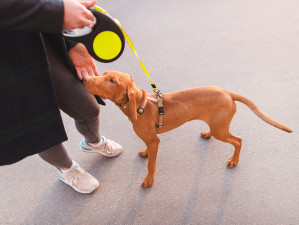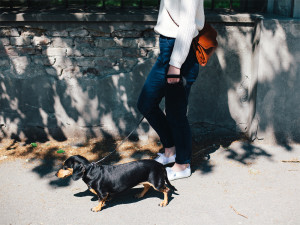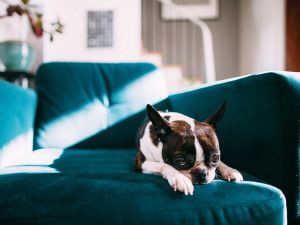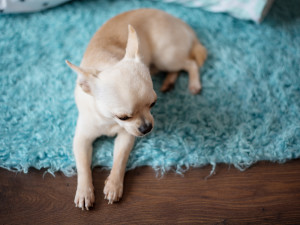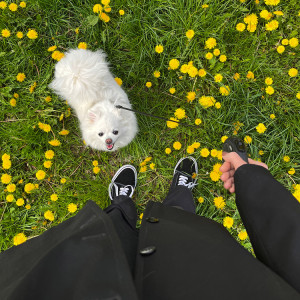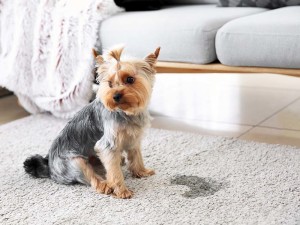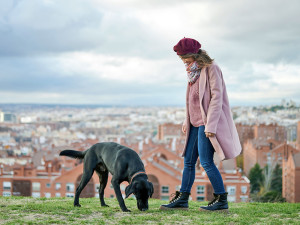How Long Can Puppies Hold Their Pee?
You shouldn’t make them cross their legs for long!

Share Article
In This Article:
How Often Do Puppies Need to Go Out? Creating a Puppy Potty Training Schedule Dealing With Accidents Puppy Potty Training Tips
Several factors, such as age, size, and individual development, play a role in determining how long a puppy can hold their pee. Learn how to understand your furry friend’s limits and create a potty training schedule that suits their needs.
How often do puppies need to go out?
Having a puppy is fun and rewarding, but it also comes with hard work and responsibilities, like housetraining. No puppy parent wants to deal with constantly finding piddle spots in their home, nor do they want to spend all their time outside just in case their puppy needs to go potty. There are a few factors that you can consider when trying to set a routine that meets your puppy’s needs.
Age
Puppies have small bladders and little discretion when it comes to emptying it. So, the younger the puppy, the more frequently they need to go out. A general rule of thumb is that puppies can hold their pee for approximately one hour for every month of age. So, a two-month-old puppy can hold it for two hours, a three month old for three hours, and so on. This maxes out at about six to eight hours, thankfully.

Activity and excitement
Many puppy parents are familiar with the little bit of pee that comes out when a puppy is super excited. Activity and excitement can stimulate a puppy to need to pee, so pet parents can plan for that. Puppies should go out anytime they have a change in activity: before and after playtime, after eating, after napping, and so on.
Water intake and feeding schedule
Puppies need to go to the bathroom shortly after eating and drinking, usually 15 to 30 minutes after. Take puppies out after mealtime and after they drink a lot of water to help prevent accidents.
Health issues
Health issues that involve the urinary or reproductive tract, like urinary tract infections or vaginitis, can affect how often puppies empty their bladders. Symptoms of health issues may include frequent urination, straining to urinate, constant licking, and foul-smelling urine.
Creating a puppy potty-training schedule
Getting a puppy can be a huge lifestyle change for many. Creating a routine early on can help new parents who are learning how to potty train a puppy.
Frequent potty breaks
If your puppy is young (under four months), plan on starting with taking your puppy out every hours. Puppies that are four to six months old should be able to hold their pee in for four to six hours, and puppies that are older than six months of age should be able to go six hours between outside breaks. These timeframes are not without exception, though. If a puppy is brand new to your home, having health issues, or having setbacks in training, take them out more frequently.
Adjust as your puppy grows
As your puppy gets older, their bladder control improves and their parents can slowly extend the amount of time that passes between potty breaks. Keeping those breaks at set times can help your puppy adjust to the new schedule.
Dealing with accidents
Every puppy is going to have at least an accident or two in the house. It’s normal. But puppy parents should have a plan in place so they can get their puppy’s potty training right back on track.
If you catch your puppy in the act, try to gently interrupt them and then quickly take them out to finish their business. The key here is to be gentle, don’t yell or spank to get their attention. If your puppy goes pee outside, give them immediate praise and positive reinforcement.
If you don’t witness the accident, it’s too late to give any cues one way or another. Don’t bring your puppy to the scene of the crime and expect them to feel bad about it. Just clean it up and move on. Be sure to clean the area thoroughly so your puppy doesn’t get the idea that it’s an appropriate location to empty their bladder. Use enzymatic cleaners if needed.
Puppy potty-training tips
Some pups get the hang of potty training as soon as a week of starting training, while others take several months and still have occasional accidents. Even pet parents that employ a rigid routine may need to tap into their patience if their pup needs a little extra time to adjust. No need to fret, here are some “do’s” and “don’ts” to help get over those puppy potty training hurdles.
Do:
Go out often: Give your pup plenty of opportunities to go pee at appropriate times and places.
Keep a close eye: Look for signs that your puppy needs to pee, like sniffing around and circling, and use that as a cue to quickly take your pup outside.
Build your puppy’s vocabulary: Pick a command word like “go potty.” Use the command words right before they pee or poop.
Use positive reinforcement: Use treats, praise, and pets to get your pup to learn the right behaviors.
Get a crate: Keep your puppy in a crate when they’re home alone or unsupervised. Pick one that’s not so big that pups think they have space to both sleep and pee.
Don’t:
Punish: Yelling or punishing your puppy for accidents can cause fear and confusion, especially if the punishment happens after the fact. Stick to positive reinforcement to get the behaviors you want.
Rely too heavily on a crate: Even pups who are doing well with crate training can decide that their crate is an okay place to pee if they are left in there too long and can’t hold it anymore.
Give too much freedom: Letting your puppy run around unsupervised too soon gives too many opportunities for accidents and undesirable behavior.
Wait for your puppy to sound the alarm: Don’t wait for your puppy to tell you that they need to go out (by then it’s an emergency). Be sure to take your puppy out frequently so they can feel confident that they’ll have plenty of opportunities to pee through the day.
FAQs (People also ask):
How often do puppies need to go out at night?
Young puppies need to go out every two to four hours, including overnight. As puppies age, they can hold their pee longer. A puppy that is older than six months may be able to hold their pee overnight (six to eight hours), but this can take more time.
How long can three month old puppies hold their pee?
In general, puppies should be able to hold their pee for approximately one hour for each month of age, up to a max of six to eight hours. So, a three-month-old puppy can typically hold their pee for around three hours.
What is the best way to potty train a puppy?
Potty training a puppy requires frequent potty breaks, lots of positive reinforcement, and tons of patience. Puppy parents should not let their puppy roam unsupervised too early or resort to yelling or punishment when dealing with accidents.
References:

Dr. Alycia Washington, DVM, MS
Alycia Washington is a small-animal emergency veterinarian with over 10 years of experience based in North Carolina. She works as a relief veterinarianopens in new tab and provides services to numerous emergency and specialty hospitals. She also works as a veterinary writer with a focus on educating pet parents.
Related articles
![Tan Chihuahua dog laying on aqua rug looking down shamefully]()
“Why Is My Adult Dog Peeing In The House?”
How to re-housetrain a dog of any age.
![A girl stands with her small white dog among dandelions.]()
How to Treat Urinary Tract Infections (UTIs) in Dogs
If your pup’s bathroom habits have changed, they might have a UTI. Here’s how to help.
![dog near pee spot on carpet]()
How to Remove Dog Pee and Other Stains From Carpet—Without Harsh Chemicals
The next time your dog pees on your favorite rug, be prepared with this simple, three-step method.
![Dog sniffing ground next to owner.]()
Your Dog Takes Forever to Find a Place to Poop Because of This Scientific Phenomenon
Your pup is a compass, but only when they are doing their business.
![Tan Chihuahua dog laying on aqua rug looking down shamefully]()
“Why Is My Adult Dog Peeing In The House?”
How to re-housetrain a dog of any age.

